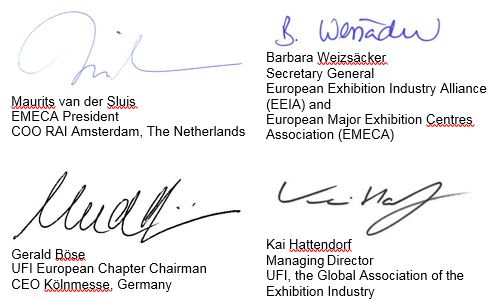Honourable President von der Leyen, honourable President Michel,
Once again, we would like to draw your attention to the impact of the coronavirus pandemic on the European exhibition industry. Trade fairs and business events were the first industry to be affected and the situation developed at fast pace until the total halt. After a few weeks only, we see the devastating effects of the Covod-19 situation on the exhibition industry. And we ask for support from both your institutions: please fight for a coordinated approach all over Europe to mitigate the disastrous impact – to avoid massive job losses and companies going bankrupt. We need help now. So that the B2B trade fairs and exhibitions will be able to play their vital role for the economy when recovery starts.
Number of exhibitions cancelled or postponed in Europe: over 3,300
The outbreak of the coronavirus has first created a complex situation of reduction of events, but in a record time basically all trade fairs and events around the globe have come to a standstill. Near to 10,000 trade fairs and exhibitions have already been cancelled or postponed globally. Initially, the main consequences were felt in Asia; so far, more than 3,300 trade fairs in Europe have been cancelled or postponed and also in the Americas all exhibitions are being halted.
Many exhibitions in Europe have been rescheduled and may take place later during the year, however the loss of turnover now puts most companies into severe difficulties. This keeps creating huge domino effects for many industries. Both sides, companies that are involved in staging exhibitions and the companies that exhibit or source on trade fairs are massively suffering under the postponements and cancellations.
Business not generated by companies that exhibit in Europe: 39 bn €
Companies that exhibit at trade fairs showcase new products and generate business. In Europe, the sales not generated this spring by companies due to cancelled exhibitions will amount to 39 billion euros. Globally, total sales losses are estimated to be 134.2 billion euros until the end of the second quarter 2020. (UFI Impact Study)
Economic losses in Europe due to exhibitions cancelled/postponed: 28.8 bn €
The economic damage in Europe caused by exhibitions not taking place as planned projected until the end of June 2020 is already as high as 28.8 billion euros. 257,000 jobs could be lost in Europe following the show cancellations so far until the end of June 2020. These are jobs generated in the exhibition sector directly but also in related domains such as transport, travel and hospitality sectors. The global economic damage is estimated to be of 81.6 billion euros of total output loss for exhibitions only. For Asia/Pacific, the impact is reaching 21.8 billion euros, for North America 29.2 billion euros until the end of Q2. (UFI Impact Study)
Economic losses in Europe including venues’ effects much higher: 124.9 bn €
If we take into account also the impact usually generated by the exhibition centres, the damage is estimated to be 124.9 billion euros. Over 1.2 million jobs may be at stake – the total number of jobs supported directly and indirectly by exhibition venues and their trade fair activities per year. Exhibition activity fuels local, regional communities and the general economy. Permanent jobs are likely to be lost entirely if the activity stops even for a shorter time without adequate and immediate support. (EMECA Impact Study)
Europe’s exhibition industry is the global leader: affected to a high degree
The European exhibition industry is the global leader in terms of exhibition venue capacity, quality and turnover. It represents nearly half of the global market share of the exhibition industry and it hosts the majority of all leading international B2B and B2C trade fairs. European trade fairs attract businesses from within the EU and all around the world. They provide a maximum number of business opportunities in one place, enabling EU companies to avoid travelling outside the EU to meet potential business partners and customers. Companies encounter a global offer of goods and services in one single international event in Europe. Many of the exhibitions cancelled were the large leading international ones, which has a particularly great effect on the exhibition companies and the related sectors: international exhibitors and visitors contribute a comparatively large part to the economic impact.
At the same time, European exhibition organisers stage trade fairs worldwide. This supports the internationalisation of European businesses into global growth markets. Consequently, part of the losses in Asia and the Americas also impact the European players. The 10 companies with the highest turnover worldwide are European and also a high degree of the smaller, specialised providers operates internationally.
Emergency for exhibition industry sector, particularly for SMEs
Short term cancellations or postponements of exhibitions have an immediate impact, because they delay scheduled business and revenues. This poses directly an existential risk especially for small and medium sized service enterprises, both exhibition players (e.g. service providers like stand constructers, logistics, catering, etc.) and customers (exhibitors and visitors of trade fairs). SMEs are the backbone of the European economy and need to be treated with high relevance by government and institutions of the Member States. We welcome the initiatives already announced by the EU and many Member States’ governments.
Concrete measures to mitigate the losses are urgently needed
Following the European Union’s institutions decisions of many of the support measures requested earlier, swift and active support of a coordinated approach in all Member States to offer the same set of emergency remedies to affected companies is still urgently needed. In particular, immediate liquidity – not only as loans but more important as instant subsidies – is required to avoid masses of companies going bankrupt.
- Subsidies and credits for the critical transition phase to be provided immediately and without bureaucracy on the local level to all sizes of companies, including micro companies and the self-employed
- Dedicated programmes offering compensation to exhibition and event organisers and related services using the new flexibility of the state aid rules during the crisis situation
- Deferral of taxes and of social contributions and other payments due for affected companies until the situation changes
- Flexibility in employment rules and conditions and support to salary payments to allow keeping employees on board during the crisis and avoid major job
Exhibition venues and providers emergency support to communities
Our sector has traditionally strong links to the local communities which is demonstrated currently in unpaired support initiatives and action: trade fair halls are offered to shelter the homeless and to host large emergency hospitals where the local supply is not sufficient in these times, such as in Milano and in Madrid. There are many other examples that illustrate how our sector helps in crisis situations with its expertise in staging installations, providing catering or transporting goods. Despite their own despair due to the uncertain economic situation and potential job losses, all our staff and companies are dedicated, flexible and ready to give in times of need.
Vital role of trade fairs in the recovery
The numbers quoted above underline the critical importance and systemic relevance of exhibitions. They will play a vital role for economic recovery by providing a fast- track for companies to the market and will trigger a multiplying effect for other industries. The exhibition industry is determined to continue serving the communities and industries in the best possible way and enable people to meet face-to-face. But we rely on the efforts from policymakers to ensure that the companies that organise these events and create these market places and meeting places will be able to fulfil that role in the future. Losing qualified employees or entire companies now would make it impossible to take up the activity again quickly to implement the trade fairs at a later date this year and would have very negative impact on the quality level required to support the recovery of economy in general.
In the medium term, EU and national programmes, for example destination marketing focussing on business at exhibitions or hosting buyers from outside Europe at the trade fairs, may help to boost the recovery effects.
Risk of losing market shares in the current situation
Besides, due to the asymmetric progression of the pandemic, players in other regions of the world may benefit the occasion to increase their market share while Europe is still in shutdown. And we will face the “competition” of massive state support to attracting large events to these regions, away from Europe, some countries in Asia have already installed such an attractive aid scheme for organisers and exhibitors.
If we do not maintain the European ecosystem of all players that together create the best marketplaces, most important events and major occasions for people to meet, we will lose much more than just the business of a few months.
The European exhibition industry addresses you for support of the exhibition industry as a platform and multiplier for many other industries and calls upon the EU Commission and the Council to ensure the coordinated implementation of powerful measures for our sector without any further delay across the whole EU by the Member States.
With our utmost respect and consideration,








Leave A Comment